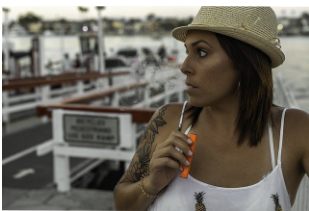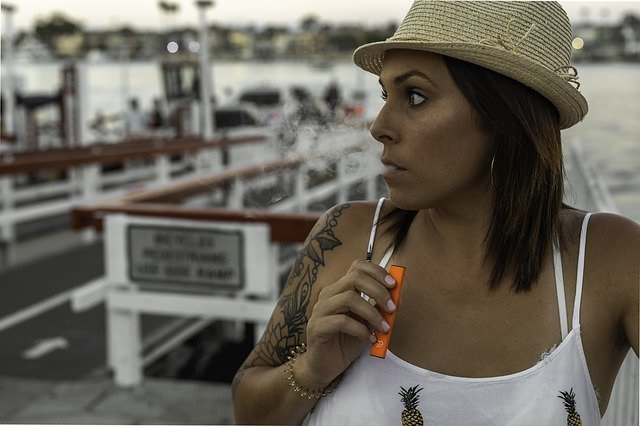Florida’s Proposed Vaping Regulations May Be In Vain


![]() There are three competing ideas to regulate vaping in Florida. The House wants to regulate vape shops and raise the age limit to match the federal standard. The Senate wants to increase the age limit and make it illegal to smoke or vape near schools. Governor DeSantis feels that the new federal age limit of 21 is enough regulation and no further action is required. All of the competing ideas have their proponents and detractors. But ultimately, it all might be a wasted effort.
There are three competing ideas to regulate vaping in Florida. The House wants to regulate vape shops and raise the age limit to match the federal standard. The Senate wants to increase the age limit and make it illegal to smoke or vape near schools. Governor DeSantis feels that the new federal age limit of 21 is enough regulation and no further action is required. All of the competing ideas have their proponents and detractors. But ultimately, it all might be a wasted effort.
The jockeying and positioning over age limits, flavor bans, and regulating vape shops are, in all probability, pointless. As of May 12, 2020, any vapor product that has not submitted a PMTA application to the FDA is not allowed to remain on the market. Big Tobacco companies can easily afford the PMTA process. However, independent American companies and vape shops will probably be wiped out. That includes several Florida based e-liquid and e-cigarette brands like the e-cigs from Mig Vapor, located in Pompano Beach. And no matter how terrific a company’s products are, they are facing a doomsday scenario.
The FDA’s PMTA Process For Tobacco and Vapor Products
PMTA stands for Pre-Market Tobacco Application. The idea behind the PMTA process is that every company must prove that its new tobacco product provides a net benefit to the public. The FDA is looking for evidence that vapor products are safer and can help people quit smoking. In the final analysis, companies applying for a PMTA will be required to show a benefit to tobacco harm reduction.
That process seems reasonable in theory. And there is a body of evidence that suggests that vaping is safer than smoking. Most notably, Public Health England has found that vaping is at least 95% safer than smoking. These arguments aside, the true impediment to American vape companies is not so much the PMTA process as it is the PMTA cost.
The FDA estimates that the PMTA process will cost about $350,000 per product. However, American e-cigarette companies assert that the cost is more like $1,000,000 per product. Keep in mind that per product means every battery, every device, every nicotine level of every e-liquid flavor.
There are a number of Florida vape companies that enjoy an excellent nationwide reputation. A couple of these companies make their e-liquids in FDA registered labs and publish independent lab reports of all of their products. But even that won’t carry any credence with the FDA. Unless they pony up the money and submit the PMTA, product quality and functionality won’t save them.
Which E-cig Companies Can Afford The PMTA Process?
There is a possibility that a few of the larger independent vapor companies based in Florida can survive the PMTA process. But most will be gone. Greg Conley of the American Vaping Association has estimated that at least 90% of the current vapor products on the market will disappear.
Conely went on to say, “The sad fact is that the only way a manufacturer of reduced harm nicotine delivery systems can navigate the complex American tobacco regulatory system is to have a successful business selling cigarettes.” And indeed the companies that can afford the PMTA process are the companies that also sell cigarettes.
Reynold American has already submitted a PMTA for its Vuse e-cigarettes. Other Big Tobacco associated brands such as JUUL and Blu also have the resources to both pay for and navigate the FDA’s pre-market tobacco application process. We will not know until the May deadline which, if any, Florida companies will have the financial capacity to submit an application. But if nothing changes, the PMTA process will accomplish what flavor and vape bans never could, a purge of vapor products.
It should also be noted that none of these dramatic changes will impact tobacco cigarettes. Regardless of what happens to vaping, every pack of cigarettes now on sale at your corner store will still be there. Cigarettes are untouched by any of the impending laws that could end vaping as we know it.
What Happens To Florida Companies and Vape Shops After The PMTA Deadline?
We do not know exactly what will happen to Florida vape shops and independent e-cig and e-liquid companies after the PMTA deadline. All we do know is that if nothing changes and if vapor industry court challenges are unsuccessful, then on May 13, 2020, the majority of vapor products will be deemed illegal by the FDA.
The sophisticated vape mods loved by vaping enthusiasts will probably be gone. As will the vape tanks that produce the huge vapor clouds. Big Tobacco vapor products are the high nicotine pod vapes you see being sold in gas stations and c-stores. Those will still be there. The high nicotine pod systems may very well be the only survivors of the PMTA purge of vapor products.
Vape shops usually sell imported vape mods and tanks along with American made flavored e-liquids. In fact, the flavored e-liquids are the heart and soul of most vape shops. Most e-liquid will be illegal on May 13, 2020. Florida vape shops will probably have very few options other than selling whatever vapor products could afford the PMTA process. In essence, that means that vape shops will have little choice but to sell the Big Tobacco vapor products.
In states that have already enacted harsh laws on vapor products, vape shops started selling cigarettes, hookah, and cigars to get by. Florida vape shops may have to become smoke shops in order to have a chance of survival.
Will The Purge Of Most Vapor Products Reduce Teen Vaping?
Much of the objection to vaping revolves around disturbing trends in youth vaping. The National Youth Tobacco Survey data shows a dramatic increase in underage use over the last few years. In 2017, the youth vaping rate was stable at about 11%. By 2019, the underage use rate jumped to 28%.
Since 2017, something else has changed in the vaping world. Specifically, the proliferation of salt nicotine pod vape systems. These devices are cheap, easy to use, and contain far more nicotine than previous e-cigarette products. It is those very pod systems, like JUUL, that are predominantly used by underage youth. In fact, despite a ban on flavored pods, teens are now switching to high nicotine disposable pods. That brings us to perhaps the greatest irony of the concern over teen vaping and the purge of vapor products from the American marketplace.
The fact of the matter is that the PMTA deadline will wipe out every vapor product except the high nicotine pod systems sold at c-stores across the country. In other words, every vapor product except those known to be used by teens will be gone.
The PMTA deadline looms as the colossus that will end vaping as we know it. Unless something changes with the FDA’s PMTA requirements, all of Florida’s back and forth between the house and senate is a sideshow. Because unless something changes, there won’t be much of anything left of the vapor industry for Florida to regulate.




